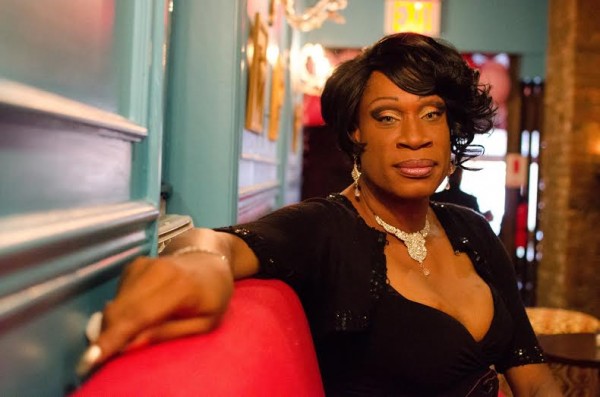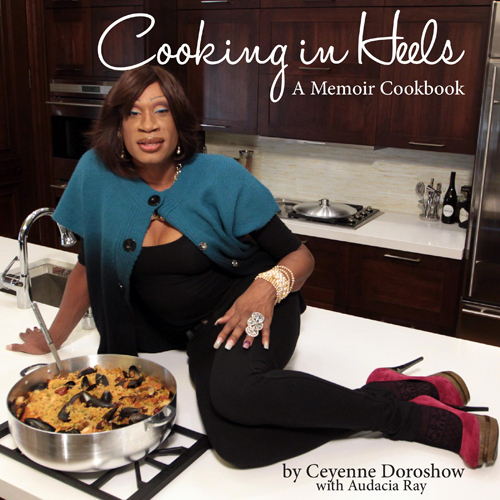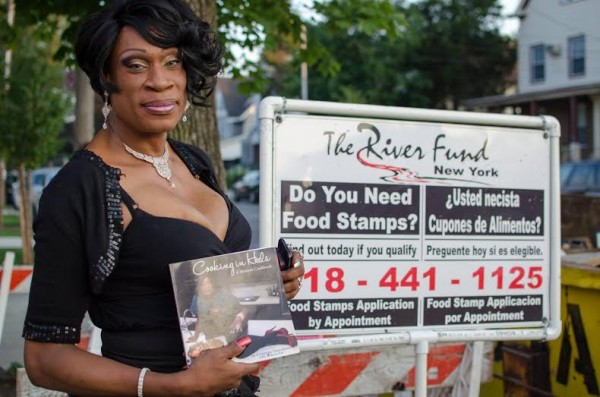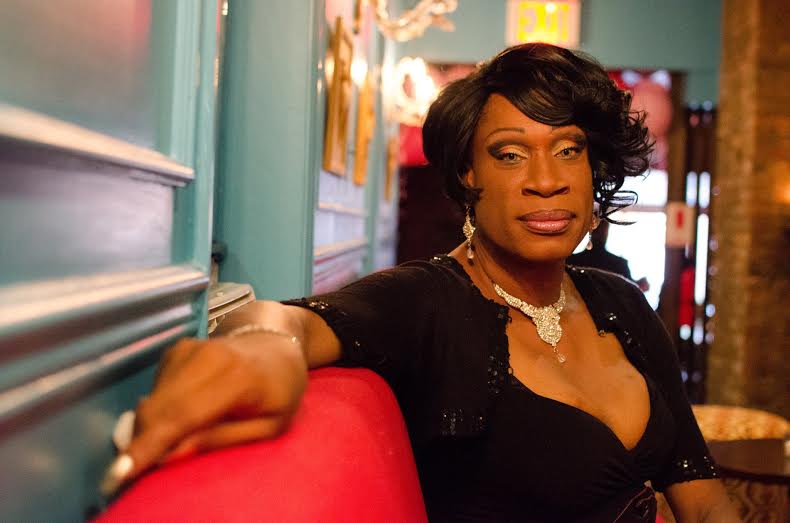
Ceyenne Doroshow originally made a name for herself on stage as one of the seasoned performance artists and audience favorites of the Red Umbrella Diaries’ storytelling nights. She is featured as one of seven sex workers who tell their story on the newly released documentary The Red Umbrella Diaries, which will have its world premiere in Portland, Oregon today. In her compelling memoir cookbook, Cooking in Heels, written with Red Umbrella Project’s Audacia Ray, she tells her story: a black transgender woman’s triumph over adversity with the help of her passion for cooking. Doroshow stays busy as a published author, a public speaker, a documentary star, and a stage darling while never forgetting her roots. She remains committed to doing activist work, whether that means incorporating her lived experiences into her performances, lending her voice to trans rights conferences across the country, fostering LGBT youth, or working at The River Fund helping impoverished families. Lily Fury transcribed this from a series of conversations with Doroshow.
What have been some of the more memorable reactions to your book?
Being nominated for the MOTHA (Museum of Transgender History and Arts) awards and voted for by women like Janet Mock…I remember the same day Audacia Ray e-mailed me a review of my book that literally brought me to tears. It wasn’t a long drawn out review, but it got straight to the point, emphasizing [that] “This book changed my life.” And that was the take home that you want to take back into society whenever you do projects, whenever you bare your soul.
It’s not just a cookbook, it’s a memoir cookbook that shares something people rarely share. There’s no school to go to when dealing with the transgender child, and there were actually parents that got in contact with me to thank me or because they had made mistakes, and it was incredibly gratifying for me that these parents recognized their mistakes through my memoir…I set out to hopefully help one person and I found out I’m helping a whole lot more, and it’s really empowering.
Can you speak about your experience being outed publicly as a sex worker and serving time?
I was railroaded. This was something that usually someone would just get a desk appearance, probably a fine, and get out, but Governor Christie wanted to make me an example…I had to serve 30 days in jail, I didn’t get a warning, I didn’t get what like most people would get—if you’re of a certain level of stature in life, you’re allowed to fix your stuff.
They put me in protective custody with [another] trans identifying person, which was safer to an extent. But being in protective custody, which is really cruel in itself, is 23 hours being locked in a cell and having to defecate in front of someone, having to bear your most private pain, your tears, with a stranger you don’t know. But at the same time, it was gratifying that there was somebody there with me in that cell. Had there not been anybody, I would have come out far more damaged.
But they had these vents in the jail and I could talk to other inmates and some of them recognized me from Jersey City and some of them recognized me from the newspaper. To…add insult [to injury]…my newspaper article was floating around the cells because the CO’s had actually shown them to the inmates and the other guards. Which had made me horrified, but at the same time I had nothing to be ashamed of. It was more the process of…them wanting to publicly shame you to the point where you may not want to live or you may become suicidal. There’s no therapy for that. In my opinion, there’s no therapy for coming home because when you come home your security is broken because the whole process of trusting the system…is revealed to be a lie.
How did you originally connect with the Red Umbrella Project?
Well, I was having a horrible time. I had just been outed by a DA in New Jersey for being a sex worker after being arrested. And having it printed in the newspaper… I had to hang my head in shame, I had to hear it from my family. But beyond that it really robbed me of my very dignity. When they bring charges against you like this, it really has the potential to ruin your life and at that time it really looked that bleak for me. I didn’t think I had a comeback, I thought, this is it. I was…the coordinator of a GLBT organization and a coordinator of a transgender group and somehow or another all of that was diminished by being outed in this newspaper article.
It robbed me of my very presence, who I was, who I wanted to be, who I was striving to be, regardless of my personal life and sex work. That was a small part of who I am, and they had just tarnished everything.
So, luckily, I had this fabulous woman who was my lawyer, Melissa Sontag Broudo, from the Urban Justice Center [‘s Sex Workers Project], who actually visited me during [the] duration of my 30 days in jail….[She] would come visit me at Newark Correctional Facility…And one day I happened to go down to the meeting room….and I had this one raggedy envelope with me. With every piece of paper that I could find I would write down recipes…This was my way of kind of curbing the starvation, cause jail food is terrible. But also, I interacted with all kinds of violent criminals, murderers…on a level that not many people [could get to] through my food.
When I got out, Audacia Ray was one of the very first people that I met through Melissa Sontag Broudo at Melissa’s office. And we sat down and I literally opened that same envelope that I had in jail that I had written all of these recipes down on the table, and she laughed at the process of it all.
She said, “So many people cook and they stress, ‘Oh I have to put in this amount and this amount’ and that’s just stressful. A woman on the go, a parent on the go, a person on the go has no time to measure shit. You need to know how to do this at a quick rate where it doesn’t take long and it’s easy to prepare and you can do it with family or friends. Most people get stressed when they have to cook: ‘Am I going to mess it up? Did I measure it right?’ etc. And that’s not cooking. Cooking is love, and it’s the essence of you that you’re putting on a plate and putting out.”
So from there how did you and Audacia Ray come to collaborate on your book?
Well, she thought that my story was incredible, and that’s why she came up with the idea of a memoir as well as a cookbook as she learned more about me. There were times during our taping where we had to stop—because we audio recorded it first—and there were times we had to stop because it was emotional for both of us.
…Audacia never came with judgement. Her purpose was to help me teach people and to have a tool out there about a life that people won’t talk about, that most families shun. This is the reason we have so many LGBT youths that are homeless and that are in foster care. They’re broken by the system. Many people are abused throughout the world, but in [the] LGBT world, when you come out you are sometimes faced with a brick wall…You’re running up against obstacles that you’re not prepared for. But if you’re strong in your conviction you have no choice but to go on.

So what has it been like filming the documentary?
The documentary opened up doors in my brain. It showed me how much patience I could have. (laughs)
It showed me a process [of]…telling a story about faith and religion…my faith with church and my relationship with church and my relationship with my God and myself, which has nothing to do with a church or a building or minister or speaker…I had to learn how to separate myself from that, because when you’re brought up in church, it’s kind of a finger pointing thing…[But] you discover your spirituality is so much a part of you and no one controls that, and no one can tell you that because you’re gay or trans that you have no religion. I went online during this process and got a minister’s license because I wanted to be able to talk to kids about God and staying strong in their selves and their conviction. Having faith can somehow give you enough, the strength of a mustard seed to be able to do something, to do something tomorrow.
How did you get involved with The River Fund?
I found out about this wonderful food bank and I just went one day and offered to give water. It was hot, it was a thousand degrees, I was on the line like most of the staff there. People were…sweating, kids were crying. I asked if I could get a tray of water and give it out to people and the director of the program—who I did not know was the director at the time—said, “really? will you?” and literally ran with me, got the water, did everything, [and] ran back. And I handed out the water and went back and he said “Good, I’ve got cookies!” So I handed out cookies.
And when I was done he said, “Please come back next week, I really want you to volunteer.” And I said “Oh, I don’t know. These people might not like me, you understand there’s a situation,”alluding to my being transgender. And he said, “Yeah, I can tell, I don’t care.” And I said, “Well, I need to tell you I was in a bit of trouble,” because I wanted to be up front. “I was a tart”—that’s the way I put it. And then he says, “So was I.” (laughs)
So right then, I thought, wow, these are very unusual people. And then I got to meet the volunteers, which are predominantly made [up] of teenagers, not court ordered but real life, going to school, working, volunteering-on-their-own teenagers…I also like the combination of adults mentoring these kids.
…At the beginning I was like, “What would a former sex worker transgender woman have to bring to this?”…I found out, a whole lot! Because now I’ve taught them something, which is acceptance. [They] accepted me way before I accepted them. The kids call me “Ms. Coy” or “Ceyenne.”They really respect me. They see me throughout the neighborhood, I see them. We stop and talk and it’s that kind of relationship that I really like to have with people.
The River Fund helps people on so many levels. They don’t just hand you out food, they hand you back dignity, they help you with resources, they help you with social security, they help you get mental health if you need it. We do a campaign for Mother’s Day with Sephora to give out makeovers. And it’s just the little things that make big impacts—one Thanksgiving we were on the Katie Couric show and I was a part of it…cutting and handing out the turkey. Christmas, we go out to the parks and give out bags and bags of Christmas toys to a family that would normally not have anything. And we are giving them hundreds of dollars worth of presents where they don’t have to go and steal or rob—we handed it to you! And then the nutrition value—that kids are now getting a complete meal. In one week we give out almost a week and a half of food, and it’s helping people financially. Children are obviously able to perform better at school with a full stomach. [It’s especially helpful] right now when the economic state is really screwed up and prices are going higher and salaries are going lower.

What was it like to be involved with the women at Trans Women’s Theatre Troupe, which made its debut alongside a Red Umbrella Diaries storytelling night at Joe’s Pub?
Now, that was something I wasn’t so prepared for. I knew I would be apprehensive, because many times in my own life, my own community [was] my downfall. Trying to help my community, trying to be there for them, all of that kind of jaded me.
But having this opportunity to work with the theatre troupe changed my mind about the girls. These young women affected me in a huge way. I became sort of like a mother figure to all of them. I am very proud of all of them. They did an amazing job, some of them stepped out of their shells and comfort zones and just soared for the stars. Some of them went and got employment right after that, because, sweetie, if you can do all of this and rehearse for a play you can go get a job…It’s nothing to go on an interview if you can do all of that.
…And being able to tell them, “I was there, I was in [your] shoes, I was homeless, I did not just come here as this picture, I was right there, I cried, I did everything, I was on the stroll, I was the person you are today,”…I hope that helped them see that you are going to be the person you want to be tomorrow.
What advice would you give to LGBT youth that are growing up right now who are struggling like you did?
I would say to anybody experiencing and questioning: look to yourself, and not so much your friends and family, but to yourself, and find the inner peace to be able to block some of the pain. Because without that temporary blockage until you can really deal with it, you’re just probable to keep hurting. But if you mentally close down the pain until you can find the resources to deal with it, it won’t hurt as much and you can get yourself to that next stage.
I’ve been called so many names that hurt but one of the names that really broke my heart as a child was being called “faggot.” It just destroyed me. I remember my grandmother saying to me, “You’re not a pile of wood, sweetie.” And I ran with that all the way to the hills…
I had noticed my parents had always said “Be true, don’t be a liar.” And they were right, as fucked up as the way they dealt with it, they were right. Because I needed to be me, and I needed to be me on a whole different level, not hiding myself, respecting myself, going to school, and making something of myself. And this was all without their support because I had ran away a long time ago.
So my mentors actually got me back into education, because my parents weren’t capable at the time…So I’d also say to youth, find a mentor that you can relate to, find a safe space where you can be you, to work through, to come out the other end.

Ceyenne Doroshow was treated horribly in NJ. I am thrilled to see she has gone on to do amazing things. She is a true inspiration to us all.
Ironically things have gotten much worse for sex workers in NJ In 2008 a NJ swat team kicked in my door without a warrant. I was sentenced to 6 months and my sentence started within 4 hours of my arrest. I also was ordered to pay a 3720.00 fine even though I was unemployed and a single mom. If a sex worker who held as much privilege as me can be abused so badly by the state, then what kind of violence and oppression will the state rain down on more vulnerable sex workers.
http://www.vice.com/read/how-the-justice-system-pimped-me-out-969